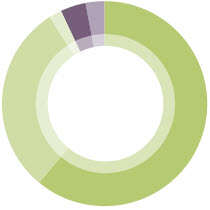Magnetic stirrers are a popular type of laboratory stirrer that use a rotating magnetic field to cause a stirrer bar to rotate within the solution. These stirrers are often combined with a hotplate and are ideal for small volumes of non-viscous liquids and for situations in which a reaction must take place in a closed vessel or system. The overhead stirrer, however, is more suitable for larger volumes and more viscous solutions, but can be less convenient and more time-consuming to set up.
Top 10 Questions You Should Ask When Buying a Stirrer or Mixer
- What applications are you using the stirrer or mixer for? What result do you want to accomplish?
- What are the maximum volume and the maximum viscosity that you can use the stirrer for?
- Which stirring element is best suited to your application?
- What are the features and specs of the stirrers or mixers available?
- What level of accuracy does the digital speed indicator have?
- What type of motor is used in the stirrer or mixer?
- Can you determine the viscosity with the torque trend measurement?
- Have you purchased everything you need to start mixing? Sometimes stirrers and mixers are sold as kits, while sometimes all or some of the accessories must be purchased separately.
- Does the manufacturing company offer application and technical support over the phone?
- What warranty and delivery options are available? How quickly will the new purchase arrive?
Types of stirrer(s) used by survey respondents:
| Magnetic Stirrer | 91% |
| Hot Plate Stirrer | 86% |
| Overhead Stirrer | 20% |
| Other | 3% |
Stirrer problems reported by survey respondents:
| Stirrer can't handle large volumes | 42% |
| Stirrer can't handle high viscosity fluid | 55% |
| Impeller frequently becomes jammed | 17% |
| Stirrer doesn't maintain speed | 24% |
| Drive motor overheats | 13% |
Nearly 51% of respondents are engaged in purchasing a new stirrer or mixer. The reasons for these purchases are as follows:
 | Replacement of aging system | 61% |  |
 | Addition to existing systems, increase capacity | 30% | |
 | Setting up a new lab | 2% | |
 | First time purchase | 4% | |
 | Other | 3% |
Top 10 Features/Factors Respondents Look for When Purchasing a Stirrer or Mixer:
| Low Maintenance / Easy to Clean | 79% |
| Performance of Product | 78% |
| Value for Price Paid | 65% |
| Low Operating Costs | 63% |
| Service and Support | 58% |
| Availability of Supplies and Accessories | 55% |
| Total Cost of Ownership | 54% |
| Warranties | 53% |
| High Flow Rate | 50% |
| Safety and Health Features | 50% |
For more information on stirrers and mixers, including useful articles and a list of manufacturers, visit www.labmanager.com/stirrers-mixers












